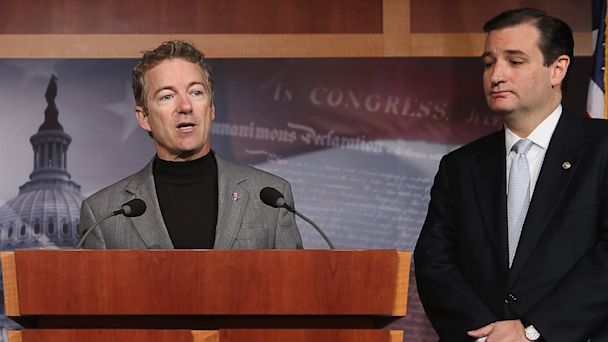What's Wrong With the Republican Party? Ask a Democrat

(Image Credit: Getty Images)
What's wrong with the Republican Party? Ask a Democrat and the answer is simple: the Republican Party.
"One of the things that emerges here is how negative Republicans are about their own party," Stan Greenberg, Democratic pollster and former adviser to President Bill Clinton, said.
Indeed, a new ABC News-Washington Post poll today found that a scant 37 percent of Republicans approve of the direction their party is going. Compare that to the 72 percent of Democrats who like what their party is doing in Washington.
Greenberg's own polling on behalf of Democracy Corps, a democratic research and strategy organization, which he released today, showed similar findings.
The divisions can be seen everywhere: Republicans can't decide on a strategy for addressing immigration overhaul. Potential presidential candidates like Sen. Rand Paul, R-Ky., and Sen. Ted Cruz, R-Texas, are the denizens of staunch tea party conservatives. The threat of their candidacy is so real that moderate Republican Rep. Peter King of New York said last week he would consider running for president in 2016 as a counterpoint to his anti-establishment colleagues.
Greenberg says the reason for the tensions is simple: Moderates don't have a home in the GOP anymore.
"What that means is that there is a group that is disaffected with its own party," Greenberg said at a Christian Science Monitor breakfast today. "And has almost no ability to control the future of the party, given the strength of the evangelical and religious segments and given the strength of the tea party segments."
"It becomes very hard for moderates to have influence," he added.
But here's the problem for Democrats: Not even their own pessimistic diagnosis of the Republican Party's problems can make them optimistic about 2014.
"It would be hard" for Republicans to win a presidential election under those conditions, Greenberg said.
But his forecast for 2014 is far more conservative.
The House of Representatives, which is in Republican hands, might become more "competitive" for Democrats, Greenberg said. And the Senate, which Democrats hold, looks slightly less likely to flip, although he concedes that Republicans are still likely to pick up seats.
Despite the pessimism appearing in the polls and being pushed by prominent Democrats, Republicans still think they have a good shot of coming out on top in Congress.
Political statistician Nate Silver confirmed the growing conventional wisdom that the Senate now looks like a tossup in 2014.
Larry Sabato, the University of Virginia's political sage, says that Republicans aren't likely to change course in reaction to their internal divisions because redistricting in 2010 made congressional seats resistant to national trends.
"I see it playing a much bigger role in 2016 than 2014," Sabato said. "I think it's likely that Republicans will gain seats in one or both houses and they'll misinterpret those gains.
"They'll see this as a validation of their positions when, in fact, the presidential election will reopen their problems."
As for 2016, Rick Wiley, a former Republican National Committee political director, dismissed the Democratic hand-wringing.
"Political parties by nature have internal conflict. It's just the nature of the beast right now," Wiley said. "It's way too early to say right now in 2013 that if Republicans don't do x, y and z, we're going to lose in 2016."